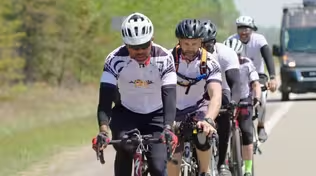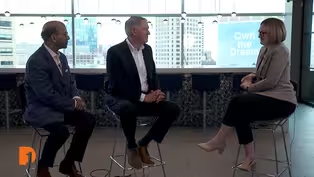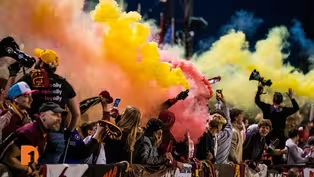
New book from veteran Detroit journalists encourages people to find value in disagreements
Clip: Season 9 Episode 47 | 8m 6sVideo has Closed Captions
One Detroit contributors Stephen Henderson and Nolan Finley discuss “The Civility Book.”
Two veteran journalists with different political views have a new book coming out titled “The Civility Book: A Guide to Building Bridges Across the Political Divide.” In i, Nolan Finley and Stephen Henderson — both One Detroit contributors — encourage people to find value in disagreements. They talk about their approaches to civility and how their friendship has grown over the years.
Problems playing video? | Closed Captioning Feedback
Problems playing video? | Closed Captioning Feedback
One Detroit is a local public television program presented by Detroit PBS

New book from veteran Detroit journalists encourages people to find value in disagreements
Clip: Season 9 Episode 47 | 8m 6sVideo has Closed Captions
Two veteran journalists with different political views have a new book coming out titled “The Civility Book: A Guide to Building Bridges Across the Political Divide.” In i, Nolan Finley and Stephen Henderson — both One Detroit contributors — encourage people to find value in disagreements. They talk about their approaches to civility and how their friendship has grown over the years.
Problems playing video? | Closed Captioning Feedback
How to Watch One Detroit
One Detroit is available to stream on pbs.org and the free PBS App, available on iPhone, Apple TV, Android TV, Android smartphones, Amazon Fire TV, Amazon Fire Tablet, Roku, Samsung Smart TV, and Vizio.
Providing Support for PBS.org
Learn Moreabout PBS online sponsorship(light music) - Nolan, I'm gonna start with you.
What does it mean to have a book about civility come out now in this moment that we find ourselves?
- Well, you know, we've been doing this for a number of years, and every year we think, we say to ourselves, "Gosh, we need this this year more than ever."
And, you know, I would think that's absolutely true in 2025, as we continue to slide toward, slide into this great divide we have as a nation, and we become, we're becoming much more entrenched in our positions and much less willing to discuss issues, politics, what have you, productively with people who don't agree with us.
- And Stephen, it's not just that folks are sort of wary or not doing it, you actually write in the book that there's actually some fear around talking to folks who may be in a different party.
- Yeah, I mean, I think if you spend any time on social media, if you watch cable news, you know, the 24-hour cable news stations, fear is the thing that kind of hangs in the air over a lot of this, that, you know, people feel like they'll be attacked, they feel like they'll be belittled, in some extreme cases, you know, people have been doxed, or these other kinds of things all over politics.
And look, politics has always been a contact sport in this country.
And there's nothing wrong with that.
People are passionate, they should be, but there have to be some guardrails.
There have to be some ground rules that allow us to get to that exchange of ideas, which I think sits at the heart of the Democratic experiment.
If we can't exchange ideas with each other it's really hard to manage the country.
But it's also hard to perfect the country, that wonderful phrase that is in the preamble of the Constitution about a more perfect union.
- So the book is not just about the need for civility, it's in many respects, the sort of how to.
Nolan, I'd like to think most folks don't wake up in the morning thinking, "I wanna be really angry, I wanna be uncivil today."
But they may wake up and not be exactly sure how to go about modeling this behavior with one another.
Talk to me about what that looks like on a day-to-day basis for you.
- Yeah, I mean, so they may not wake up that way, or wanting to be that way, but they certainly, too many of 'em are waking up that way.
And this book, "The Civility Book" published by Wayne State is about our experiences together.
I mean, we are not two people who in today's world should be friends or as close as we've become over these last 17 to 18 years we've been working together.
I mean, we don't agree on anything and we have some very passionate disagreements, but we've learned to have those disagreements and extract some value from them without destroying our friendship.
In fact, our friendship has only become stronger.
And what we do in this book is offer a whole series of tips and share our own experiences and those of others on how you do this.
- Stephen, give me some examples of some of the approaches.
- We start with this idea of dropping assumptions.
You know, right now when we meet somebody and they tell us they're a Republican, or a Democrat, or a conservative, or a liberal, we draw all kinds of conclusions about what that means about who they are and what they believe.
We ask people to hold off on that, let that person tell you who they are, what they believe, and why.
We talk about setting reasonable expectations when we're having these conversations with people we disagree with.
I think a lot of times right now, people wanna beat the other person into the ground, right?
Show them how wrong they are.
Instead, we talk about trying to extract value from the differences in the way we think and feel and not think about winning or losing the conversation.
We talk about listening, investing in the other person's ideas, and we talk about the fact that we've been at this for 18 years and neither one of us has ever gotten up from one of these arguments and said, "You know what?
That's it, I'm done with this guy."
I think the intentionality of that is one of the things that's really required to say, you know, a lot of times there's hurt feelings between us.
A lot of times there's anger, there have been times when we've stopped, you know, recording an argument and not spoken to each other for a couple of weeks, that's okay.
But saying, "I'm done with this person because I don't like what they say is how we've gotten to where we are."
And so you've gotta make that decision that it's worth having this relationship and the ability to exchange those ideas even under the most uncomfortable circumstances.
- I wanna grab on to what you talked about is this intimacy of this relationship that the two of you have had now for nearly two decades.
- That's a private matters, though.
(Zoe laughs) - And I am curious, Nolan, about what this can mean for someone who doesn't have that kind of relationship.
You know, you also, Stephen, talk about these kind of conversations that you've had with family members, right?
These are people with whom you have deep relationships, but it seems to me where much of the work also needs to be done in society today is with folks that were just passing on the street.
- Yeah, that's it.
And I mean, Steve and I of course didn't start out close when we first met each other.
We had a lot of learning to do.
But you know, we offer a couple of truisms that I think help people take this the first step and sort of put these conversations in the right context in a civil context.
First thing we say is that all good people come to their opinions in the same way.
They take the information, the data available, they run it through the filters of their own experiences and their own personal values, and they come up with a viewpoint.
If it's different than yours, it doesn't make them evil, it simply means they've lived a different life and they've had different experiences, whole different values.
It's important to find out to learn what those experiences and values are before you sit down and start to engage.
It leads for a lot more respectful interaction.
The other thing we say is that a conversation's not a competition.
And so, if you're sitting down with the goal of converting someone, give it up.
I mean, nobody enjoys that, and it's not really possible.
We've been at this for a long, long time.
I've never converted Steve to my way of thinking on hardly anything.
And so we ask people to switch their, to set a more honest goal for a conversation, and that is to learn from each other, to understand each other a little better.
Black Leaders Detroit launches 1,645-mile Ride for Equity to support Black entrepreneurs
Video has Closed Captions
Clip: S9 Ep47 | 4m 50s | Black Leaders Detroit CEO Dwan Dandridge shares details about the 2025 Ride for Equity. (4m 50s)
Michigan leaders will discuss economy, jobs and more at 2025 Mackinac Policy Conference
Video has Closed Captions
Clip: S9 Ep47 | 7m 36s | One Detroit contributor Zoe Clark gets details about the 2025 (7m 36s)
One Detroit Weekend | Things to do around Detroit this weekend: May 23, 2025
Video has Closed Captions
Clip: S9 Ep47 | 1m 41s | Cecelia Sharpe and Peter Whorf of 90.9 WRCJ share upcoming events for Memorial Day weekend. (1m 41s)
Providing Support for PBS.org
Learn Moreabout PBS online sponsorshipSupport for PBS provided by:
One Detroit is a local public television program presented by Detroit PBS














